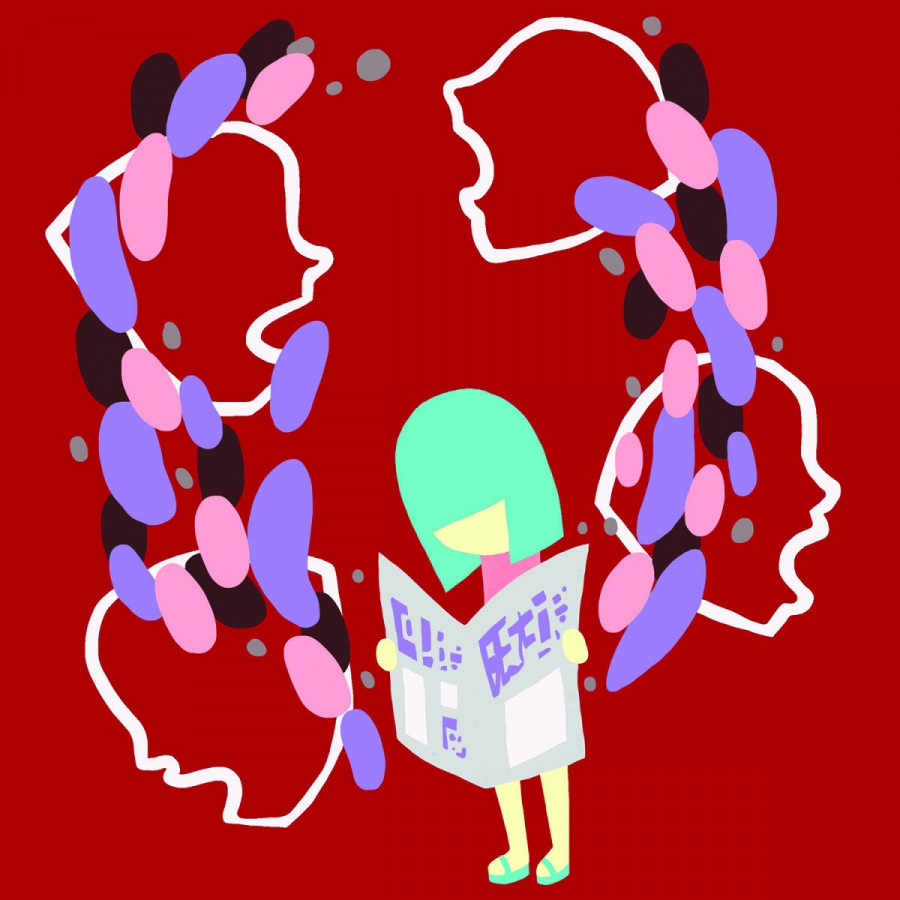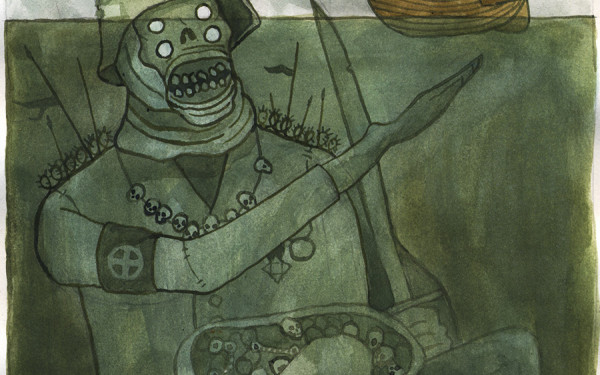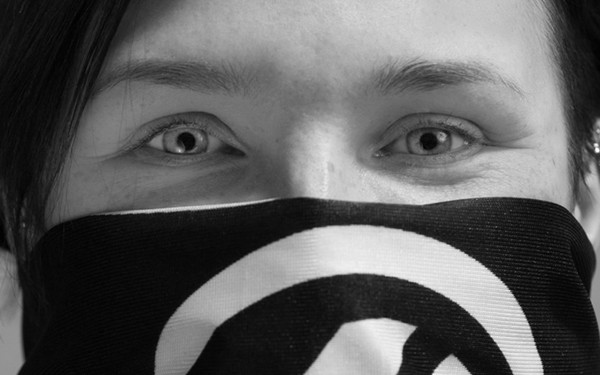Mainstream Media Is Giving the Far-Right Exactly What They Want
Journalists Need to Fact-Check and Ask the Right Questions
Mainstream coverage of far-right groups, both in Quebec and beyond, has left something to be desired.
In the United States, since Donald Trump’s election, we saw the birth of a new trend in news outlets—the glorification of the new face of the far-right.
Profiles of alt-right leaders that marvel at their style, articulation, and impeccable hair suddenly became en vogue, like the Mother Jones profile on Richard Spencer that begins with the white supremacist in a hotel lounge “deftly plucking” togarashi-crusted ahi with chopsticks as he explains that being of a different race is the equivalent to being of a different species.
The intention of these profiles was perhaps not to glorify, but all the same, that is exactly what they do. They legitimize and give a platform to groups with racist agendas that they are actively trying to enact.
To varying degrees, many prominent news outlets have fallen into the trap of legitimizing far-right groups through their coverage. Here in Quebec we’ve seen it after far-right protests in Quebec City in August and November 2017. It may not be intentional, but through a search for sensationalism, a thirst for a good story, misrepresentation of the issues and simply lazy reporting, mainstream media has successfully given these groups validity in public discourse.
And here’s the danger to that: if far-right groups are to be taken seriously, they know that they have to be palatable to the public. That is how they recruit new members—by giving their ideology a way to be identified with.
Dan Feidt and Wendy Parker, journalists from the American media collective Unicorn Riot, highlight various methods used by alt-right groups in the United States to try to make their platform accessible to newcomers in a 2017 episode of the podcast Delete Your Account. There, Feidt and Parker discuss meme pages as a method used by the alt-right.
Another tactic they say is used by American far-right groups to recruit is the manipulation of public perception through the media.
In Quebec, La Meute has been very successful at this. Xavier Camus, professor in philosophy at Collège Ahuntsic and political writer, points out that journalists frequently rely on the sanitized message of the spokespeople of this group, but ignore the racist discourse of the membership which is more in line with the true nature of these groups.
“These groups take care of their public image, presenting themselves as legitimate and moderate groups. But when you look at their private forums, the hateful messages become more visible and uninhibited,” said Camus. “Right now, larger media outlets prefer to just parrot exactly what the leaders of these groups hope to have communicated.”
He points out the laziness of this style. “If journalists don’t have time to investigate and fact-check the propaganda, then at least seek the opinion of experts who will give a clearer perspective.”
In an article for iPolitics, Martin Patriquin elaborates on this trend in Quebec media.
“If La Meute is enjoying a certain sheen of legitimacy these days, it’s in large part due to a mostly credulous press,” he wrote.
“Over the last year, much of the coverage of the group has glossed over its demonstrable hatred of Islam, instead presenting La Meute’s members as a bunch of hardscrabble rogues deeply troubled by religious extremism.”
He uses a December 2016 CBC feature by Jonathan Montpetit as an example. While he commends Montpetit’s coverage of the group at a time when not many other journalists in the province were, he points out that the article only touches on the surface of the group’s views on race, and ignores the outwardly racist discourse present in their Facebook group.
Franklin Lopez, who runs the anarchist, anti-capitalist media platform subMedia, highlights the danger of journalists not properly contextualizing the racism present in the discourse of these groups: “Their vision of America is to have a state for white people. They would like to kick out by any means necessary anyone who doesn’t have this full European bloodline.”
“When [the media] use these terms like ‘white nationalist’ and don’t really explain the actual views of these folks, it creates a situation where people say ‘Well, these are people who might be a little radical but they just have a different point of view,’” he explained.
Patriquin also posited, and Camus agreed, that there tends to be an exaggeration of La Meute’s membership based on the traffic their Facebook page gets.
Patriquin points out that mainstream media has been reporting very large membership numbers: CBC reported 40,000, and Radio-Canada reported 60,000. “On its face, it’s an impressive number—roughly the population of Cornwall, Ontario,” he wrote. However, he explains many of the names listed on the page were added without the person knowing.
Camus said that once again, lazy reporting has led to this inflation of the numbers.
“There is no objectivity in journalism and anybody who tells you that exists is deluding themselves.”
—Franklin Lopez
“Journalists give a platform to racist groups without taking the time to fact-check, which leads to shameless lies being published. La Meute says they have around 60,000 members, when the truth is they probably have around 1,000, when you observe the interactions on their private forums,” he said.
Camus explained that those roughly 1,000 members are members who participate in the group by liking a post or commenting at least once a month. Out of those members, about 400 are really active, as they participate five or more times a month.
“If La Meute really had 60,000 members, how can we explain that they are only 150 to 200 people at their demonstrations?” said Camus. “Journalists are coming across as very naïve when they don’t take the time to investigate further.”
According to Lopez, all this—news outlets relying on the comments of these groups’ spokespeople, not taking the time to contextualize the level of racism present in the discourse of their membership, and the misinformation reported—shows how Canadian media is manipulated into providing far-right groups with a platform, just like in the United States.
“By failing to reveal the more extreme views of what these groups have, what the mainstream media has done over the past year and a half […] is that they have given a platform, they have created a visibility for these groups and this is exactly what these groups want,” Lopez explained. “These folks are not dummies. I think Richard Spencer is a highly intelligent person who is very good at manipulating the media. And the media has been manipulated.”
Not only have far-right groups been misrepresented and given a platform, anti-fascist groups and individuals have been severely misrepresented as well, and denied access to a platform.
“The media portrays them as violent folks who mask themselves and basically just want to wreck havoc,” said Lopez.
He went on to explain that the reality is that people involved in anti-fascist efforts are people who are studied in history and see the need to remove these groups from the public discourse as they are forming, before they gain prominence and numbers.
“It’s not an exaggeration to say that there was a moment in history that if these groups would have been stamped out in their infancy, the course of human history would have been quite different,” he said.
“These are folks who are risking a lot by doing this work, their own safety, and they’re doing this voluntarily because they really care about the state of the world.”
So why are they portrayed as violent street gangs, then, if that’s not the case?
“That visual is very enticing to the media who usually likes to cover things in a very sensationalistic way, but it’s also a very lazy image,” explained Lopez.
It’s a lazy image because it is only a small portion of what antifascist efforts look like, yet it is certainly the most inflammatory.
“Because when you look at the work that anti-fascists do, the grand majority of the work is not street actions, I think that’s the part that you can take a photo of and you can take some video of,” he furthered.
He said that a lot of the work anti-fascists do is research to expose fascists, find out where they get their funding, and how to dismantle their infrastructure.
“It’s a lot of thankless work and a lot of people who do this work are not in the media, they’re not talking to the media, they’re actually doing their work undercover because it’s very dangerous work. And the same goes for the people wearing the masks,” said Lopez.
The foundation of journalism as we know it is the principle of objectivity, of reporting without individual bias and “getting both sides.” But more and more experts and journalists in the field are pointing out the shortcomings of this: how can a reporter completely separate themselves from their biases when they are what make up their entire world view?
“There is no objectivity in journalism and anybody who tells you that exists is deluding themselves,” said Lopez.
How a journalist chooses to cover a story will inherently be influenced by their personal biases.
Lopez also explained that the topics reported on will depend on the political stance of the media outlet. The CBC, being a pro-Canadian nation state outlet, will report in a way that promotes Canada’s industries, and runs the risk of ignoring the potential negatives of those industries unless there is significant pushback from the population.
How the far-right and anti-fascist efforts are covered in mainstream media reflects this.
“If we want to cover ‘both sides,’ let’s give a voice to all of society, the vast majority of which opposes the far-right,” said Camus. “The media gives the microphone to the spokespeople who conceal their message so they can appear moderate and reasonable. Peddling lies and propaganda is certainly not up to the high standards of objectivity sought out by journalists. Analysts and experts should be consulted to decode these messages.”
“I think that we just have to be honest with ourselves if we’re going to be media makers that we definitely want to give people their fair say. But we also have to be honest about what we want to see in the world,” said Lopez.
He believes that journalists need to start asking far-right groups the hard questions. “‘What do you think about migrants? What do you think about Jewish people? What do you think about women’s role in society?’”
When asked why these questions are not being asked, Lopez posited that perhaps it has to do with the lack of diversity in mainstream media.
“They don’t want to get into a position of having to address the fact that a lot of these media outlets are run by white people, and they’re run by white men generally. I think that maybe going into these lines of questioning can actually lift the veil on the hypocrisy.”




1_600_375_90_s_c1.jpg)
11_900_647_90_600_375_90_s_c1.jpg)

